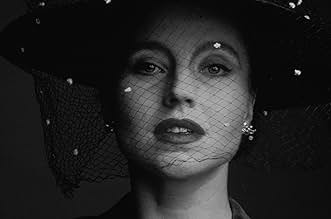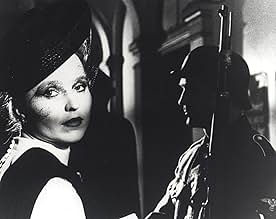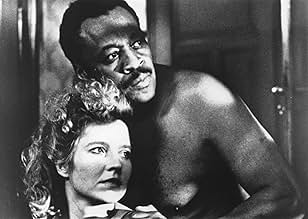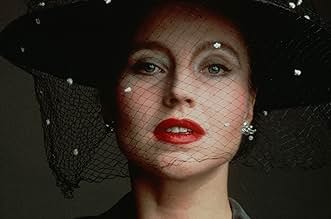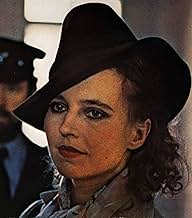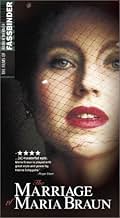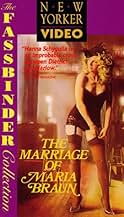अपनी भाषा में प्लॉट जोड़ेंMaria marries Hermann Braun in the last days of World War II, only for him to go missing in the war. Alone, Maria puts to use her beauty and ambition in order to find prosperity during Germa... सभी पढ़ेंMaria marries Hermann Braun in the last days of World War II, only for him to go missing in the war. Alone, Maria puts to use her beauty and ambition in order to find prosperity during Germany's "economic miracle" of the 1950s.Maria marries Hermann Braun in the last days of World War II, only for him to go missing in the war. Alone, Maria puts to use her beauty and ambition in order to find prosperity during Germany's "economic miracle" of the 1950s.
- पुरस्कार
- 13 जीत और कुल 7 नामांकन
- Bill
- (as George Byrd)
- Hans Wetzel
- (as Günther Lamprecht)
फ़ीचर्ड समीक्षाएं
In the rubble of the Second World War, Maria/Germany survives, between a tenuous hope of returning to the lost past and the agony of a miserable and dishonorable present.
But the defeated have no right to shame. It is up to them to rebuild the future in the bed of the victors, until they learn to live without them, more than autonomously, as new victorious powers, taking the place of those who humiliated them. In life, in the economy or even in football (Fassbinder coincides the narrative climax with the 1952 World Cup final, in which Germany became champion, for the first time in the history of the competition, thus using yet another metaphor for German reconstruction).
After the victory is complete, the honor is washed away, life ends and it is time to give way to others, to the future, which must not repeat the mistakes of the past.
A bold message and a powerful performance by Hanna Schygullla.
Fassbinder at his best.
The Marriage of Maria Braun is a film that operates on two different levels. On the one hand in can be seen as a look at one woman's struggle against adversity in the hardships of the post war years. While on another, the film can clearly be read as a critique of the way the new Germany forgot it's awful past and sold it's soul in order to prosper in what would become known as the German Economic Miracle. This latter reading can be determined by reading the main narrative as an allegory in which Maria Braun represents the new Germany. She begins by prostituting herself to the Americans and ends very wealthy but emotionally dead; she forgets her past quickly in order to concentrate on her future.
There is no doubt that Rainer Werner Fassbinder put together a clever allegorical film here. And there is also no doubt that Hanna Schygula is very good in the lead role. But I did have difficulty with empathising with the people in this story, as none of them were particularly likable. Perhaps that was the point of course. But, whatever the case, the film left me cold unfortunately.
It seems to me that rather than being a cynical portrayal of those difficult years, it is more truthful and revelatory in a deep way. I imagine that no one other than those who lived then can begin to tell the story, which is why Fassbinder has tried on our behalf -- to try to convey to us the angst, the frustrations, the sadness, the insanity, the querulousness, the fragile hope of that era.
I find the story very sad, of course, because in my early-21st century psyche I'm more tuned into the love story than I am the tale of the sociology and social psychology of an era that occurred when I was very young. It seems to me that if one views the characters as representatives of some of the major "world views" obtaining during the reconstruction period, one sees a few of the many different human reactions there can be to such an experience: Many feel burned out and can't feel hope any longer; others, like Maria, feel there is at least money and position to be gained under the new dispensation; some simply don't care; others try to feed off the experience without contributing; and so on and so forth.
It also occurred to me that, at age 60, I may be in a position to appreciate this film more, and certainly to be more understanding of and sympathetic with the characters/types portrayed. I found each of them to have an important story to tell, whether it was a "good" story or not. And the character of the Black US Army Sergeant, while tragic at the end, was itself an essay in human relations that has to embarrass most Americans -- the fleeting moments when he and Maria found joy and pleasant times together were just wonderful to behold, and an indictment of our sad history in that regard.
View it and see what you think!
क्या आपको पता है
- ट्रिवियाInspired by "Mutter Courage und ihre Kinder" (1938/39), a play by Bertolt Brecht, and Baby Face (1933).
- गूफ़At the end of the cut of the two kids blowing up the firecrackers, they start laughing but no sound is heard. The sound of laughter is heard on the next cut after they get yelled at by the man scavenging for wood.
- भाव
Maria Braun: I'm a master of deceit: a capitalist tool by day, and by night an agent of the proletarian masses - the Mata Hari of the Economic Miracle.
- क्रेज़ी क्रेडिटAt the very end of the credits the following persons are 'credited' by their picture: Konrad Adenauer, Ludwig Erhard, Kurt Georg Kiesinger and Helmut Schmidt and a disconnected phone line can be heard.
- साउंडट्रैकIn The Mood
Written by Wingy Manone, Andy Razaf and Joe Garland
टॉप पसंद
- How long is The Marriage of Maria Braun?Alexa द्वारा संचालित
विवरण
- रिलीज़ की तारीख़
- कंट्री ऑफ़ ओरिजिन
- आधिकारिक साइटें
- भाषाएं
- इस रूप में भी जाना जाता है
- The Marriage of Maria Braun
- फ़िल्माने की जगहें
- उत्पादन कंपनियां
- IMDbPro पर और कंपनी क्रेडिट देखें
बॉक्स ऑफ़िस
- बजट
- DEM 19,75,000(अनुमानित)
- US और कनाडा में सकल
- $8,144
- US और कनाडा में पहले सप्ताह में कुल कमाई
- $11,623
- 16 फ़र॰ 2003
- दुनिया भर में सकल
- $11,869
इस पेज में योगदान दें



